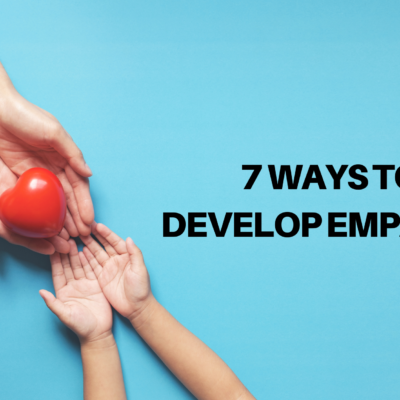7 Ways To Develop Empathy: Empathy is the ability to understand and share the feelings of another. It is an important part of human connection and social connection. In a world that usually seems divided, promoting empathy can bridge gaps, build understanding, and create a more empathetic society.
Creating empathy is a journey that includes self-reflection, open-mindedness, and a readiness to connect with others on a deeper level. In this article, we will talk about 7 effective ways to develop empathy.
Also Read:
- Best Way to Stop Negative Thoughts.
- Some Best Activities for Self Recovering.
- Ways to Express Anger in a Healthy Way.
- Learn How to Express Your Feelings.
- How to Help My Anxiety and Depression?
7 Ways To Develop Empathy:
Practice Active Listening
One of the basic pillars of empathy is active listening. In our fast-paced lives, we usually find ourselves distracted by our thoughts. To understand others, we must develop the skill of active listening. This means giving our complete attention to the speaker, putting aside our judgments, and fighting the urge to develop reactions while they are speaking.
Active listening includes not only hearing the words but also paying attention to non-verbal signals such as body language and facial expressions. By completely engaging with the speaker, we create a space for them to express themselves genuinely. This practice lays the foundation for genuine understanding and connection, encouraging empathy in our interactions.
Seek to Understand Different Viewpoints
Empathy flourishes on a variety of thoughts and experiences. To develop a more understanding mindset, actively seek out different viewpoints and be open to understanding different worldviews. This may include engaging in conversations with people from different cultural backgrounds, reading books from different authors, or exposing yourself to different perspectives through media.
Understanding that everyone’s experiences shape their viewpoints authorizes us to value the richness of human diversity. By actively seeking different points of view, we break down stereotypes, challenge biases, and develop a more inclusive and compassionate worldview.
Practice Self-Reflection
Empathy starts with understanding oneself. Engaging in regular self-reflection helps us recognize our biases, prejudices, and areas for personal growth. By questioning our beliefs and acknowledging our vulnerabilities, we become more attuned to the emotional states of others.
Self-reflection also involves identifying and handling our emotions. Developing emotional intelligence permits us to guide complex feelings and react with empathy in difficult situations. When we understand and accept our own emotions, we become better prepared to empathize with the emotions of those around us.
Engage Yourself in Others’ Experiences
Stepping into someone else’s shoes is a powerful way to create empathy. Actively seek opportunities to engage yourself in the experiences of others, whether through volunteering or engaging in cross-cultural activities. Being open to different lifestyles and challenges provides a firsthand understanding that goes beyond theoretical knowledge.
Develop Interpersonal Skills
Effective communication and interpersonal skills are important components of empathy. Being able to express your thoughts and emotions clearly while also being open-minded to others’ expressions creates an surroundings helping with empathy.
Practice expressing yourself empathetically, ensuring that your words and actions mirror a genuine understanding of others. Additionally, grow your ability to pick up on non-verbal cues and be sensitive to the emotional tone of a conversation. The better experienced you become at handling interpersonal dynamics, the more naturally empathy will flow in your relations.
Have a Curiosity
Curiosity is a powerful trigger for empathy. Develop a curious mindset by approaching the world with an open heart and a real interest in others. Ask questions to find the stories behind people’s experiences, attitudes, and emotions.
A curious mind aims to understand instead of judging. By showing a genuine interest in the lives of others, you create a space for them to share their truths. This curiosity not only heightens your understanding but also conveys a sense of care and respect, building the foundations of empathetic connections.
Practice Random Acts of Kindness
Small acts of kindness can create a wave effect of empathy. Engage in random acts of kindness regularly, whether it is helping a neighbor with groceries, offering a kind word to a stranger, or simply listening to someone who requires an ear.
These acts not only have a positive effect on others’ lives but also contribute to a culture of empathy. They support the idea that everyone’s experiences and emotions are reasonable and worthy of consideration. Through these small gestures, we contribute to the creation of a more empathetic and connected world.
At The End
Developing empathy is a transformative journey that needs intentional effort and a commitment to understanding the different range of human experiences. By practicing active listening, seeking different outlooks, engaging in self-reflection, engaging ourselves in others’ experiences, creating interpersonal skills, developing curiosity, and practicing unexpected acts of kindness, we can promote a more empathetic community.
As we venture on this journey, let us remember that empathy is a skill that can be expanded throughout our lives. By adopting these seven ways to develop empathy, we not only enhance our well-being but also contribute to the creation of a world where understanding, compassion, and connection thrive.








